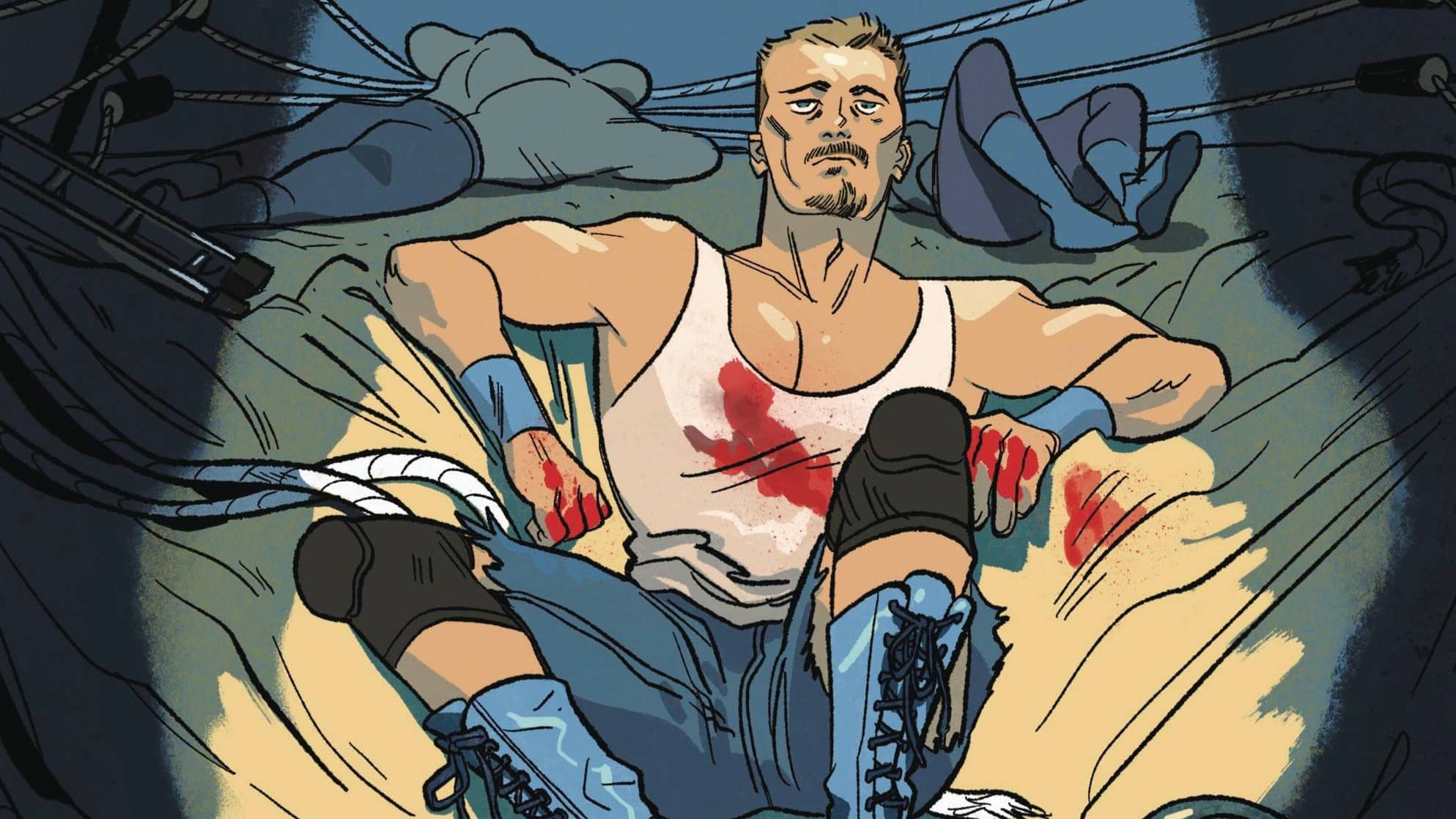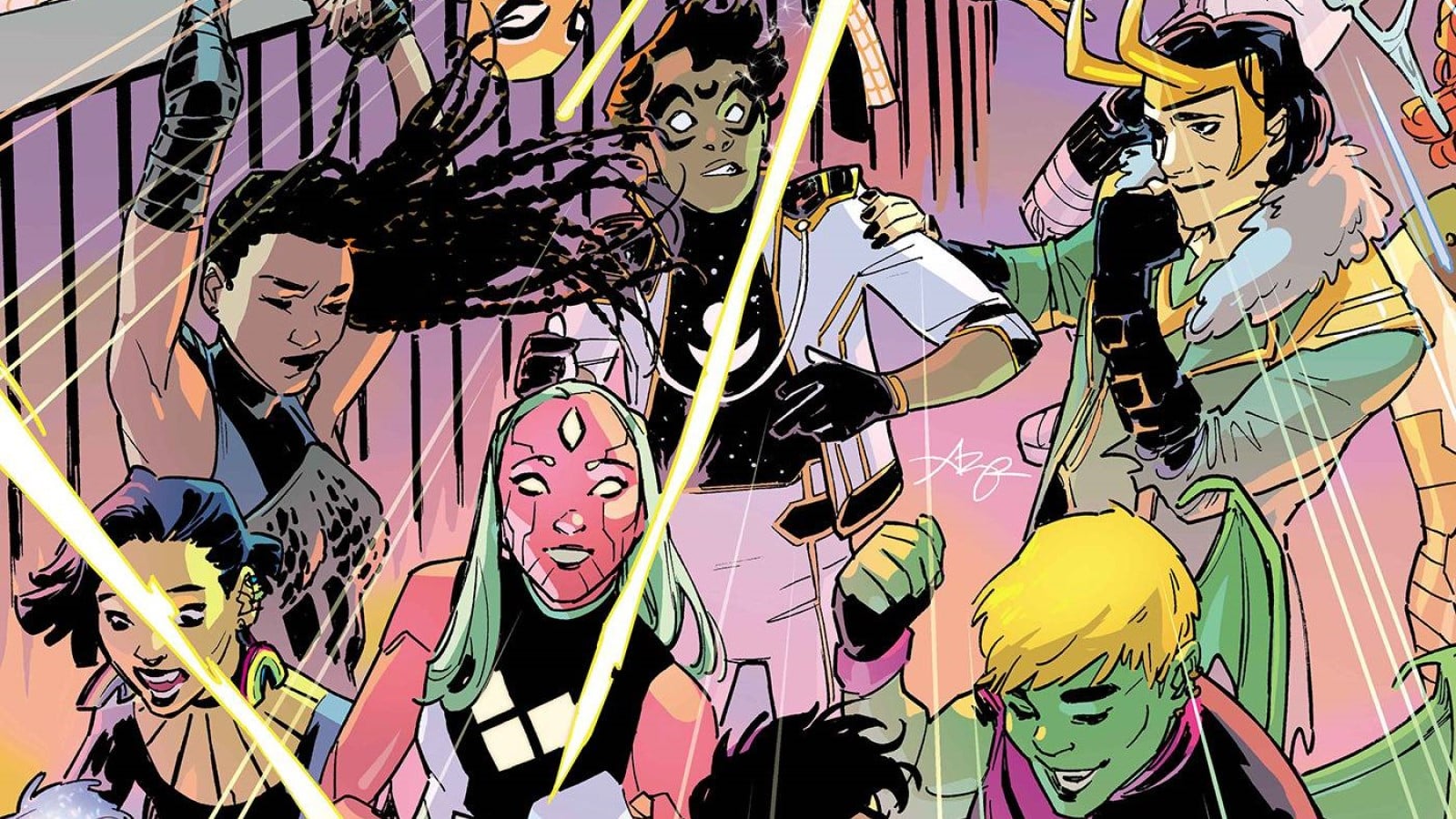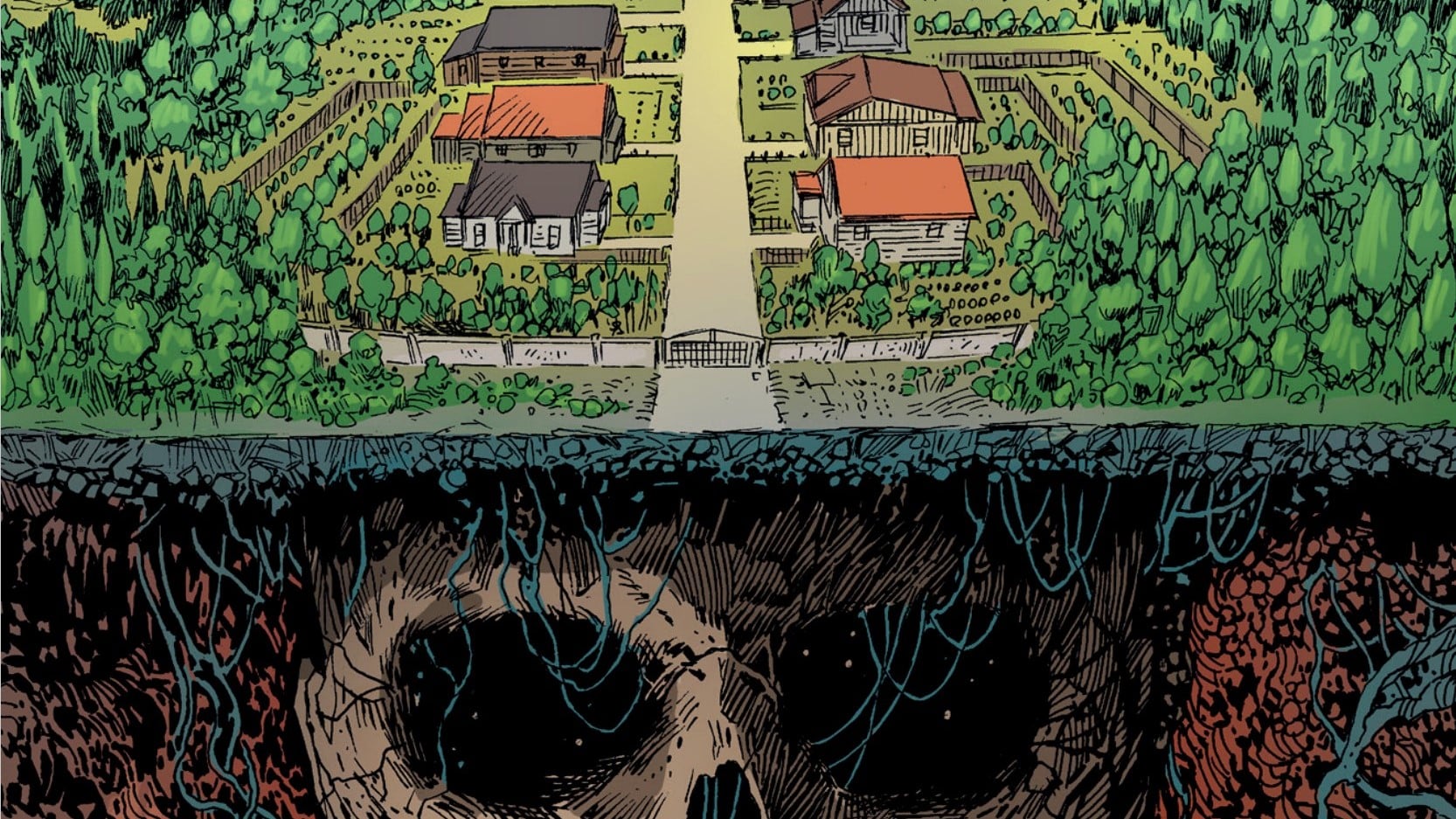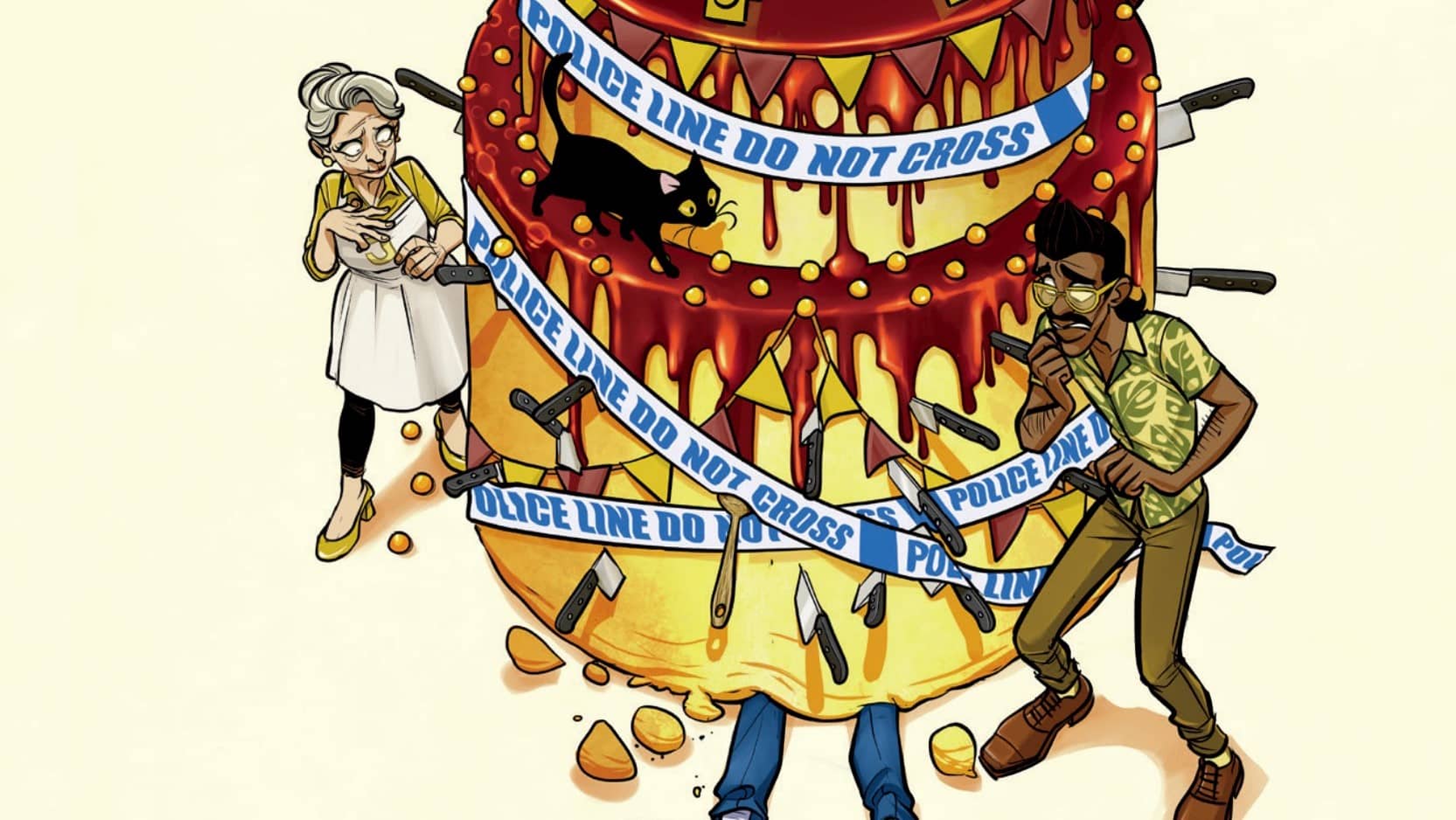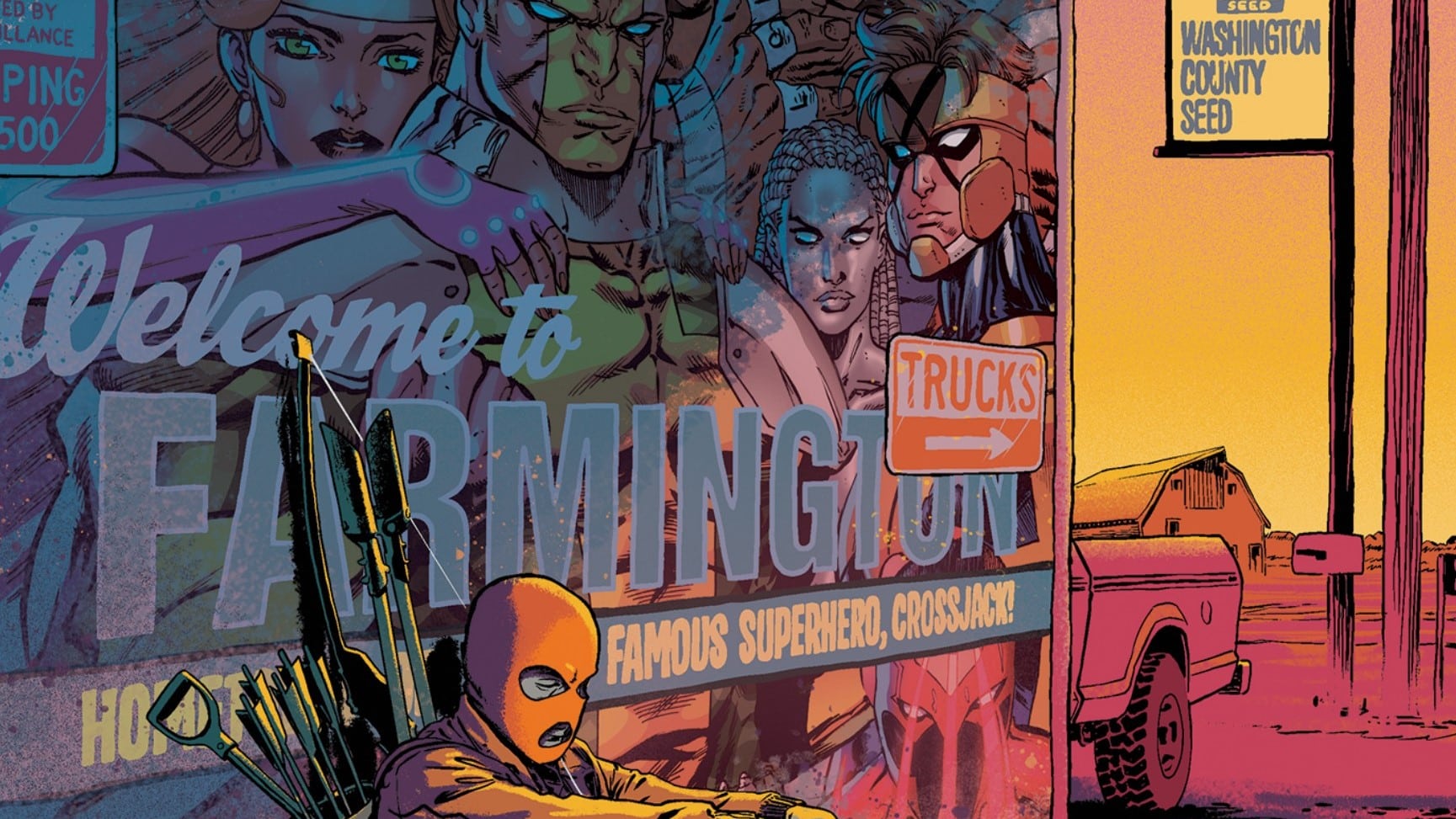Ron DeSantis is a pile of human excrement molded into human form and stuffed into a suit. The comic about him isn’t so great either. Political Power: Ron DeSantis is written by Michael Frizell, drawn and colored by Martin Gimenez, lettered by Benjamin Gilbert and published by TidalWave Productions.
Roy remains the center of the universe … and maybe his journey should be over by now. Traveling to Mars #6 is written by Mark Russell, drawn by Roberto “Dakar” Meli, colored by Chiara Di Francia, lettered by Mattia Gentili and published by Ablaze.
What if John Cena killed a guy in the ring with superhuman strength? Wouldn’t that be weird? The Gimmick #1 is written by Joanne Starer, drawn and colored by Elena Gogou, lettered by Rob Steen and published by AHOY. Backup stories “A Brief Interview with a Playwriting Robot” and “Above It” are written by Kevin Credo and Kirk Vanderbeek and illustrated by Rick Geary and Ameilee Sullivan, respectively.
What if the solution to inflation was just printing more money? We get that and more innovative policy solutions in Justice Warriors #3, written by Matt Bors and Ben Clarkson, drawn by Clarkson, colored by Felipe Sobreiro, lettered by Bors and published by AHOY. Backup story “Talkin’ Shit” is written by John Ficarra and illustrated by Carol Lay.
Will Nevin: One week in, and I already hate the new bit, Ian. I think it’s doing its job. What an ass hell of a comic we’re starting with.
Ian Gregory: This is an unprecedented pick, even for you. I may need to stage an intervention.
Political Power: Ron DeSantis: What the Shit

Will: If you have a life and don’t obsessively scroll through ComiXology’s new releases each week like me, you might not know that the Political Power series — which appears to be aimed at the book fair market — has covered just about any notable political or media figure from the last 15 years. We’ve got everyone from Donald Trump, Barack Obama and a handful of Bushes to Anderson Cooper and Rush Limbaugh. And while it seems to skew right given the selection (I’m not sure Michele Bachmann, for example, was notable enough to include in that list of luminaries), like I said, there’s a pretty good mix of folks being profiled.
So there’s a reasonable argument for including man-sized-bag-of-rotten-clams Ron DeSantis in this series: He’s the governor of a supposed state. He’s running for the Republican nomination for president. He pretends to be a human in public spaces.
But this thing just fuckin’ sucks. Not only is it just stupid (It opens with his experience losing the 1991 Little League World Series, as if anyone gives a shit), but it’s narrated in what purports to be his voice, which might be fairly authentic, because it makes me want to fuckin’ punch the nearest forest to death.
“For some reason, it’s been widely reported that we were married in 2010,” DeSantis narrates over panels of his wedding, correcting a terrible error because he was ACTUALLY married in 2009. “Reporters should learn due diligence. Simply pulling my marriage license would prove them wrong.”
First, that’s some psychopathic shit to put in your comic book. Second, it made me track down his actual marriage license, in which I learned his middle name is Dion. His team shat the bed in the Little League World Series *and* his middle name is Dion. What a fucking loser.
Ian: Will, do you get these for free? Please tell me you didn’t spend money on the Ron DeSantis biocomic. I refuse to do so myself, so I just read a couple pages of the preview and a press release from the publisher and an interview with the author.
Will: No comment.
Ian: By far the most insufferable thing about this comic is the DeSantis narrative captions. If Tidal Wave wanted to position this as a biographical series, to educate people about the candidates, then maybe they should have just gone for the neutral voice instead of having them be narrated by an approximation of the subject’s voice (for, as far as I can tell, DeSantis and other prominent political figures have nothing to do with their depiction in these books).
That means that someone — Michael Frizzell, in this case — had to sit down and write this book as if they were Ron DeSantis. As a result, parts of this book are hilarious in hindsight. “DeSantis” claims that Donald Trump is a great role model for children. This is a good joke just on its face, but also ironic now that DeSantis and Trump are essentially mortal enemies for the upcoming primary. “DeSantis” recalls getting married at Disney; also funny. “DeSantis” also laments the “unhinged socialist views” of Democrats, which is at the very least a decent approximation of his voice.
Will: The rest of this sucks ass, too. The transphobia wasn’t surprising, but the racism (in the form of a classroom discussion where some teacher argued the South was just Defending Its Way of Life!!! ™) was actually a bit shocking. I hope this thing doesn’t make it to the book fair.
Ian: Given that this book was written by Frizzell and not the actual Ron DeSantis, I have to wonder how that feels. Is the pay worth it, to write this? Does it feel good to uncritically reproduce DeSantis’ views and voice? This didn’t have to happen. DeSantis himself did not set out to produce this book as part of his campaign. There’s only one reason to write this book, and it’s to profit from his fans and supporters. TidalWave says it themselves in their press release: This is their niche. This is how they make money. It’s not about anything else, really.
What about Frizzell? In an interview, he casts himself as a neutral biographer, but I know a thing or two about biography, and this isn’t that. Biography is not faithfully and uncritically recording everything your subject says. It’s not blindly recreating their own personal mythos. All biographies — all proper biographies — have stances, and they have arguments. That’s how history works, as a field.
This is just roleplaying as Ron DeSantis, so a fifth-rate comics publisher can make an easy buck on some of the worst people in this country. If it were down to me, I would rather die than write this comic.
Will: Co-fuckin’-signed, Ian. Well said.
Traveling to Mars #6: Are We There Yet?

Will: In terms of resolving our cliffhanger from last issue — that some death row parolees were after Roy in an attempt to prevent him from being the first to Mars — here’s what one reviewer had to say:
“I’m hoping that this is a bait-and-switch that will encourage us to think about these convicts, sentenced to death just the same as Roy, as real people, too. If not, then I think it will pretty much undercut the entire point of this series.”
Ian, I do believe you nailed it. Not only are these convicts dispatched of relatively quickly, but Roy does indeed remark on the disposability of all of them, himself included. We don’t really get anything to humanize them — not sure that there would have been space for that — but Russell hit the note you reckoned he should have.
Ian: I’m glad you quoted that, because I thought it might be gauche if I had to do it myself. I’m not so sure he does what I wanted. It still reads to me that Russell just ends up relying on “death row convict” as meaning “definitely evil person who we don’t have to think in depth about.” It’s a convenient bit of cultural shorthand that is simply not borne out in real life, given how many innocent people have been cleared from death row — or executed anyway. You’re right that Roy feels guilty, but they’re practically less than characters. They have no personality, no character, just the appearance of what you might think a death row inmate should look like. (Side note: incredibly funny that these dudes got their sentences commuted like, while they were sitting in the electric chair. Do people still not know that you can sit on death row for years and years?)
I think this exposes the sheer solipsism of this series. Roy is, essentially, the only human in the entire book. All the other corporate people are profit-seeking caricatures. His ex-wife is perfect, but exists only in his memory. The robots are basically just little kids. This is a world just for Roy, and for Roy’s feelings. For a book about human dignity, it doesn’t really afford much to anyone but the main character.
Will: One more point about the Apollo 13-inspired (and seemingly scientifically accurate-ish) space battle: I didn’t think the art captured it particularly well. Maybe that’s the point if we’re trying to downplay it, but it was hard to make out what was happening sequentially … which is a big deal in comics.
Ian: I think that making a big spectacle of the space battle was a mistake. As a science fiction fan, I like that it was just Roy assembling a bunch of junk, and I like the acknowledgement that real space battles would really be quite slow and subtle (barring some real super-advanced future technology). But I think resolving it all with a big, vision-obscuring explosion is tacky. Once again, it hides the faces of the men Roy kills from the viewer. Don’t worry about them! They don’t matter!
Will: Finally, does it surprise you at all that this looks to be (at least) a 10-issue series? You could tell me that we’d wrap it up in seven, and I’d believe you. Having this much space to tell a story has to be an advantage of working with a smaller operation like Ablaze.
Ian: I’m getting concerned that this is going to run far too long. I was expecting six issues out of this series, and I could take eight, but I seriously have no clue how this is going to make it to 10 without making me want to strangle Roy. Maybe if there were more involved characters in this book beyond just him, but as things stand now I’m worried we’re just going to dive ever-deeper into Roy’s misery.
Will: Does it make me a bad person for *wanting* more of Roy’s misery? I think it does.
The Gimmick #1: What’s the Deal Here?

Will: Shane Bryant is probably the world’s most famous professional wrestler, the headlining champion in what appears to be a dead ringer analog for WWE (with Bryant himself bearing a resemblance to megastar John Cena) until he becomes the world’s most wanted murderer after he punches through an opponent’s face in front of a crowd of 40,000 people. It’s an interesting starting point, but I’m not sure the book really finds anywhere to go after that — due in part to being stuck somewhere between comedy and drama.
If Bryant really has superpowers (which he appears to indeed have), what can the FBI do to him? What peril can there be for this guy? Sure, super strength doesn’t imply invulnerability, but man, do the stakes feel low here.
Ian: Hmm. I enjoyed this issue but left dissatisfied, and I think you’ve nailed why. There are lots of little, interesting dangling bits here: his odd parents, the wrestlers he left behind, the family of the man he killed and his baby. I think the consequences of this would most likely fall on those he cares about, on those around him, rather than on Shane himself. That could be interesting. But instead they all just want to find him, and he drives straight to Mexico to do lucha instead. It feels like an unnecessary diversion from the payoff.
I think, structurally, I would like this to be a one- or two-issue story. Shane going to Mexico and doing bits with his buddy in the car doesn’t feel like it fits in the story; worse, it feels like the author just trying to extend the story. Maybe if you cut down on the side characters you could keep the tension boiling. Shane kills the guy, flies away but sticks around. He can’t leave his friends or family, and that creates a bit more drama as the FBI realizes he’s trying to stay in contact with them. Right now, the dramatic action peaks just a few pages in and it’s all stalling after that.
Will: If nothing else, I’ll say this for the creative team: This does appear to come from a love and appreciation of wrestling. The nods to gimmicks (see what I did there?!) from over the years have to be more than coincidental. And Vince McMahon — if left to his own evil devices — would turn what happened into an angle for television.
Ian: I don’t really have any complaints about the wrestling angle. I think it’s well done, actually, and I like that it addresses the very politically fraught nature of some gimmicks. I think on a core pitch level, this series has a lot going for it: A pro-wrestler who secretly has Superman powers is interesting. As they raise in the story itself, why isn’t he a hero? What’s up with his past? These are questions whose answers interest me.
Will: I thought the short stories here were solid, especially Kirk Vanderbeek’s “Above It.” Love a good ambiguous ending.
Justice Warriors #3: This Here is the Good Shit

Will: See, now, this here is a thing that gets the tone right with its full-on, hard-bore, non-stop bloody satire of a capitalist police state. Satire doesn’t have to be funny, but it has to have a point — and this series continues to do both quite well. I don’t know what I liked more in this issue: the literal turd cop introducing his buddies to his hot, human wife or the bumbling administrator getting ready to trigger another economic meltdown with his idea to print money and drop it from helicopters. And I thought we had it rough with inflation, Ian.
Ian: “Oh no, Schitt is her family name” is so stupid and yet still funny. I loved the scene with the consultants. “No true consultant!” they yell when the helicopter heir states his plan to just Print More Money, as all true consultants advocate only for deep and brutal austerity and budget cuts.
The police stuff still works pretty well, if only for how effortlessly they reproduce the cold and callous language of modern policing: “paid leave,” “mental health interventions” and “they need us to stop them from doing something they’ll regret.” The entire protest-turned-riot being kicked off by a false flag is also a nice touch.
Will: The art continues to be a real joy as well. Turd cop’s dripping appendages? Deliciously gross. The little bus ad advertising the administrator’s “My Struggle”? Oh boy. Layers upon layers.
Ian: The density and variety of characters on display in these pages is really impressive. The final pages where the crowd surrounds the blobfish cop are very well done. The number of sight gags packed into each page is great, and the one that jumped out to me this week is the Bored Ape getting brained by a cop. Ben Clarkson is doing good work on this book.
Will: This book takes the total piss out of cops, doesn’t it? I thought the most effective single page was actually Bors’ short about officers disappearing a critic — six panels of getting straight to the point.
Ian: I’m not really sure where things are going with the astrology stuff. If it really is just a joke about how silly astrology is, then it’s a few years too late to really be topical. We’ll see if it’s all a cover for something else, though.
Does This Smell OK?
- Sound Effects Watch: Kind of a weak week in the SFX department. Justice Warriors doesn’t use any, and both Gimmick and Traveling to Mars are sparse. I guess I’ll give this one to Justice Warriors for “GAY BABY” graffiti in the background.
- Rapid fire questions:
- What’s the best Tom Hanks movie?
- Will: Forrest Gump is Boomer trash, and Philadelphia is a personal blind spot. Maybe Road to Perdition? I need to rewatch that to confirm.
- Ian: I’m realizing now that I’ve barely seen any Tom Hanks movies. I dunno, Toy Story?
- Will: You don’t get out much, do you?
- If you were a wrestler, what would your gimmick be?
- Will: I’ve got two: an entitled academic (“The Professor”) or a guy from a Southern city like Birmingham or Atlanta who rips off Andy Kauffman’s gimmick for small local indie shows.
- Ian: I think I could muster a passable vampire gimmick.
- Is there any fictional cop exempt from ACAB?
- Will: I’ve got a soft spot for the Stabler-era SVU, but that’s an emotional argument and not a rational one. And Stabler himself was a prick.
- Ian: None. Not even the dogs.
- What’s the best Tom Hanks movie?
- If you use leftover oatmeal originally made for human consumption in a skin care routine, you’re officially a weirdo.
- Apparently, you can turn leftover doughnuts into gin. Thanks, food science!
- Not sure why anyone thought you could leave something uncovered in your fridge and it would be just fine, but just to clarify, no, you can’t do that.

